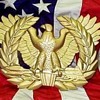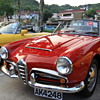Posted 11 years ago
 Chrisnp
Chrisnp
(310 items)
Here’s my other Remington rolling block – The .50-70 Caliber Remington Rolling Block as issued to the New York State Militia.
After the Civil War, with more than enough firearms in inventory, the Regular US Army wasn’t enthusiastic about purchasing new designs. As the era of the muzzle loading rifle came to an end, the Feds were more interested in converting their existing stocks to breach loaders. When the Army finally decided to adopt a new breach loader, several models were tested, and in spite of the high performance of the rolling block, the Army went with an in-house design very much like the conversions.
New York, however, was not bound by what the Regulars did, and so ordered 15,000 Rolling Blocks, with a follow up order of an additional 4,500 a couple years later. The Remington Rolling Block would serve New York until the 1890s, and one source indicates rolling blocks served with NY Militiamen deployed out West during the Indian Wars.
The New York rolling blocks had some special features. For one thing, the state specified these had to have a half-cock safety. What really stands out though is the rifle’s exaggeratedly long hammer spur and large side located breach block lever – both with shield shaped cross hatched thumb grips. I guess New Yorkers had fat fingers. The rifle is marked with patent dates on the top tang of the rifle (alas too pitted to read on my example) and the stock bears the inspectors cartouche (also alas, it’s too light to read the initials on mine). Mine is also marked 18 and H on the back of the butt plate – I assume that’s a rack number meaning rifle number 18 in Company H.
The rifle came with a model 1887 sling. Although that would also be correct for this rifle at the end of its use, I already had a sling like that on another rifle. I replaced it with another vintage sling designed like military slings of the 1860s and 70s. I’m not sure if that’s 100% correct, but it is period and looks good. As usual, I’ll describe the bayonet in my next post.
The rifle is chambered for the .50-70 cartridge, which meant a .50 caliber bullet using 70 grains of powder. This cartridge was developed for the Regular Army in 1866 and replaced by the .45-70 cartridge in 1873. Too bad New York didn’t get the memo in time for the 1872 rifle.
I took this rifle to the range with 20 rounds of ammo and found out I had the ultra-rare version of the NY Rolling block that shoots around corners! Actually after a few shots without hitting paper, I examined the bore and saw a silvery mound on one side of the bore a fraction of an inch down the muzzle. A chunk of corrosion exists there that is barely noticed when the bore is clean – but it’s apparently just enough to nick the side of the cast bullet as it passes and throw it off of its intended path. Each following shot builds up lead there until it’s obvious what’s going on. I’ve been considering trying to polish that corrosion smooth with a Dremel tool, but I doubt this old veteran will ever have acceptable accuracy unless the barrel is relined (won’t do it) or counter-bored (might consider it).
WARNING: Many vintage firearms are unsafe to shoot and I do not advise shooting them since I do not know the specific firearm that may be involved or its condition.



























Yeah, worst spot for a deformity.
Thanks for the love officialfuel, Dan121156, EJW-54, Manikin, blunder, vanskyock24, pw-collector, geo26e, Longings, tom61375 and aghcollect.
Thanks for the love ks85, toolate2 and Windwalker.
Another very fine piece. Perhaps it was designed for use by those who may be wearing gloves.
Thanks doe the love rhinoman and fortapache, and also for the comment. Possibly gloves were considered. New York gets cold in the winter.
Great gun very nice condition great post as well.
Thanks for looking and the comment Caperkid.
Ant thanks for the love Rattletrap, Caperkid, Militarist, kotkinjs1, petey and trunkman